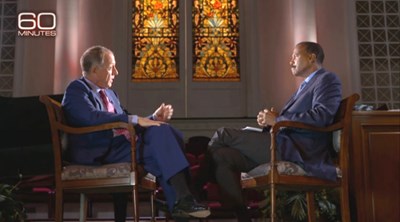
Copyright (c) 2016 Baptist Press. Reprinted from Baptist Press (www.baptistpress.com), news service of the Southern Baptist Convention. The original story can be found at http://www.bpnews.net/47747/former-sbc-pres-on-60-minutes-addresses-refugee-crisis
EDITOR’S NOTE: Please see additional story on Johnson Ferry Baptist Church’s outreach to Syrian refugees below this article.
MARIETTA, Ga. (BP) — Amid today’s tumult of political rhetoric and social discourse about Syrian refugees entering the U.S., a pastor and former Southern Baptist Convention president spoke out in an Oct. 16 “60 Minutes” report, as well as a Sept. 11 sermon, calling on Christians to lean on God’s Word to determine how to respond to the Syrian refugee crisis.
 F
F
ormer SBC president Bryant Wright, left, pastor of Atlanta-area Johnson Ferry Baptist Church in Marietta, Ga., appeared on CBS’s “60 Minutes” to discuss the Christian response to the refugee crisis as well as his own church’s involvement in helping settle Syrian refugees in the U.S.Screen capture from CBS News Bryant Wright, senior pastor of Johnson Ferry Baptist Church, said Christians are not to make decisions about Syrian refugees “by our feelings, by our fears, by talk radio, by political candidates, by political ideology, by news stations, by news outlets and publications.
“We are to make our decisions according to the teaching of God’s Word,” he said in his message to his Marietta, Ga., congregation in September on the 15th anniversary of the worst terrorist attack on American soil.
During the 60 Minutes segment, titled “Finding Refuge,” correspondent Bill Whitaker reported that 13,000 Syrian refugees have resettled in the U.S. in the past year, and more are coming.
After the terrorist attack in Paris in November 2015 that killed 130 people, 31 governors called for a complete halt to the Syrian Refugee Program, Whitaker reported. Georgia’s Gov. Nathan Deal also signed an executive order denying state services to Syrian refugees, an action prompting a letter from Wright, urging the Republican governor, a man he voted for, to reconsider.
“Our calling … is far higher to follow Christ and do what Christ teaches us to do than whether there’s an R or a D behind your name,” Wright, former president of the Southern Baptist Convention, said during the 60 Minutes interview.
The governor’s ban was later withdrawn after it was deemed illegal by Georgia’s attorney general, Whitaker reported.
Just as the political response to the Paris terrorist attack was unfolding, the first Syrian refugees began arriving in the U.S.
“Desperation is really the one word that best describes what refugees feel,” Wright preached in September. Such desperation, he said, “drives them to what is often an impossible hope … seeking to flee a reign of terror … and looking for a better life to come.”
The 60 Minutes report highlighted the thorough screening process each refugee family must undergo before being admitted into the U.S. The U.S. security check can take up to two years, Whitaker reported.
In his sermon Wright underscored the different roles the government and church fulfill in the Syrian refugee crisis.
The role of government, he said, is to uphold the common good, to protect citizens from within and without, to administer justice and to punish evil, while the role of the church is to love our neighbor as ourselves, particularly to care for those in need, he said.
“The government has decided 10,000 Syrian refugees are coming. That’s not our decision. Isn’t it better to reach out and love these folks than to give them the cold shoulder? Which approach do you think might cause a Muslim refugee to be more sympathetic to Islamic terrorism? Which approach? To me it’s a no-brainer,” Wright said in during the 60 Minutes interview.
Wright acknowledged in his September sermon, “We are living in a world of fear today in 2016.” Still, as in the parable of the Good Samaritan in Luke 10, Christians are called to love our neighbor as we love ourselves, he said.
“Our neighbor is our fellow man. It’s all mankind — people from all religious backgrounds and non-religious backgrounds, people from all different people groups and ethnicities. Our neighbor is our fellow man and especially our fellow man that is hurting,” he said.
Drawing on Matthew 25, Wright said, “How we respond to refugees and immigrants is how we respond to Jesus.”
Jesus, he said, was the ultimate immigrant as He “left His native land in heaven to come to our land here on earth.”
The war in Syria has taken the lives of almost a half million people and created the largest refugee crisis since the end of World War II, Whitaker reported.
Wright asked his congregation, “If you’re a follower of Christ, where is the outrage concerning the humanitarian disaster that is going on in Syria and Iraq in the Middle East?”
Members of Johnson Ferry Baptist Church began helping Syrian refugee families settle into their new homes in America last December.
Bryan Hanson, assistant pastor of global ministries national at Johnson Ferry Baptist Church, noted that “a lot of people want to make this (the Syrian refugee crisis) a political issue; for us, it’s a biblical issue.”
It wasn’t the first time the suburban church has helped resettle refugees. In the 90s, the church helped resettle refugees from Kosovo, and in 2006 the church helped resettle Hurricane Katrina victims.
The first Syrian refugee family the church welcomed into its community arrived on Dec. 1. Others soon followed. Today the church is helping resettle seven Syrian Muslim families and one Iranian Christian family — a total of 37 people, including 20 children — in its upper-middle-class predominantly Republican suburb of Atlanta.
The response of Johnson Ferry Church along with Wright’s teachings run parallel with a resolution adopted by messengers to the Annual Meeting of the Southern Baptist Convention this past June, to “encourage Southern Baptist churches and families to welcome and adopt refugees into their churches and homes as a means to demonstrate to the nations that our God longs for every tribe, tongue, and nation to be welcomed at His throne,” while also calling “on the governing authorities to implement the strictest security measures possible in the refugee screening and selection process, guarding against anyone intent on doing harm.”
More than 120 volunteers from Johnson Ferry church are involved in the refugee resettlement ministry. On a weekly basis, approximately 50 are actively serving in some way. The ministry is time and energy-intensive.
The goal is “helping families become self-sufficient, productive and integrated into society,” Hanson said.
As the church ministers to the refugee families, “We want them to learn about Christ. Christ loves us so we love them. We want them to understand.
“There are no strings attached for our love for them. We’re sharing the love of Christ. We’re being the church as God has called us to be the church,” Hanson said.
Please see additional story below.
**********
Getting “off the couch” changes
heart in refugee ministry
By Margaret Colson
MARIETTA, Ga. (BP) — Johnson Ferry Baptist Church began ministering to a Syrian refugee family last December, just weeks after the terrorist attack in Paris that killed 130 people.
In spite of the attack and the ensuing political storm regarding Syrian Muslim immigration, the suburban Atlanta church’s senior pastor Bryant Wright was “unwavering” in his resolve to minister to Syrian immigrants coming into the U.S., said Bryan Hanson, assistant pastor of global ministries national at the church.
“Doesn’t it just make sense that it is far better to reach out with the love of Christ to people in need who have undergone incredible suffering than to give them a cold shoulder to where they possibly become embittered at the U.S. and more vulnerable to evil influences in their lives?” asked Wright in a sermon on Sept. 11.
Currently the church is helping resettle seven Syrian Muslim families and one Iranian Christian family — a total of 37 people, including 20 children and even one baby born in the U.S. — in its upper-middle-class suburb of Atlanta.
Robbi Fernandes, a volunteer with the church’s refugee resettlement ministry, noted that “when you sit with a woman refugee and watch a video stream of her sister getting married in Syria and wipe the tears from her eyes … when you help a 56-year-old man send photos of himself home to his 80-year-old mother that he knows he will probably never lay eyes on again … when you walk into school with a teenage boy and see the excitement on his face that he can actually attend school again … when you witness a call come in from Syria and hear the crying on the phone and see a man weep in despair … it changes your heart.”
Syrian resettlement in the U.S. is not without risk, acknowledged Hanson. Yet, risk “does not diminish our calling” as Christians to do “what God has called us to do.”
While fear may be an understandable response to Syrian refugees, he said, “Love drives out fear. The opposite of fear is not courage, but love.
“As you begin to have relationships with the refugees, as you begin to love them, as you begin to put faces with the statistics, fear is driven out,” he said.
Church member David Hicks, who is involved in the church’s refugee ministry, agreed.
“Once you meet these families and their children, you see that they are truly grateful for any help. As a Christ-follower, we are called to help others,” he said.
Johnson Ferry’s relationship with each refugee family begins with meeting the family at the airport and inviting the family to stay in the home of a church member for a few nights. Then the family is taken to its new home, which has been fully furnished by church members. From there, a whirlwind of activities over an extended period of time helps acclimate the families to the U.S. Volunteers also help teach the families English, enroll the children in school, provide transportation, teach driver’s education, assist with homework, help adults obtain green cards, assist in job searches, teach adults how to write checks and use ATM’s and more.
The refugee families are “surrounded by people every day who love them. The day is rare when these families don’t receive some kind of touch from our church,” Hanson said.
The goal of the ministry is to help the refugees become self-sufficient and productive members of society as they experience God’s love through those who are helping them.
After arriving in the U.S. in December, the head of household of the first Syrian refugee family — who had never written a check in his life — was able to pay his bills for the first time this past summer. He works at a catering company owned by a church member. His son is enrolled in kindergarten.
“There is joy and pride in becoming independent,” Hanson said. “It’s very humanizing not relying on other people.”
For Fernandes, a wife and mother of a 13-year-old daughter, being a Christian means “action. It means that I have to get off the couch and actually do something. I need to follow Christ’s example of standing up for the vulnerable, loving the unlovable, showing compassion to others. When you turn off the rhetoric of the media and stop and look at refugees as human beings, as people that Christ died for, how can you not want to help them?”
She got “off the couch” to serve a Syrian family of four — a husband, wife and two children. The family left behind another adult child with two small children in Syria, along with other close family members.
“The most important thing I am doing is being their friend,” said Fernandes, a preschool teacher. Practically, she provides a weekly English lesson, assists with transportation needs, serves as a liaison between school teachers and the family and meets other needs as they arise.
She also prays for them. “I pray continually that they will see Christ in me. I pray that they will come to know and accept Jesus as their Savior,” she said.
In mid-July Hicks drove one of the refugees, a Kurdish father of three young children who is trained as a tailor, to a job interview at a window treatment shop owned by a Christian.
“It was great to see God’s timing and the father’s face as he was able to begin part-time work the Monday following his interview,” said Hicks, adding that the business owner has been pleased with the quality and speed of the refugee’s workmanship. Hicks has continued to provide transportation to and from the job for the man, and he has helped him with tax withholding forms.
In going through daily routines with refugees, talking about religion with them is “natural,” said Hanson, “because religion is such a large part of who they are and their daily lives.” The seven Syrian families are all Muslim.
“If we reflect the love of Christ with them, we’ve done what we’re called to do,” he said.
The refugees, whom Hanson has known for less than a year, “are my friends now. I want them to believe. I hope they will become my brothers and sisters in Christ.”





